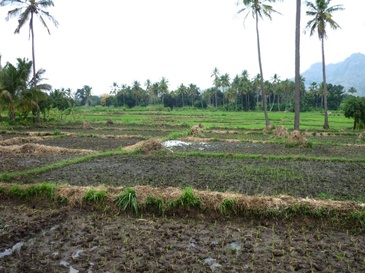 Achieving food security remains a critical challenge in agriculture-based societies characterized by low-input and subsistence farming. Climate change and weather extremes pose an additional risk that farmers have to deal with in order to sustain their livelihoods. With land resources being finite, planning for food production at local, regional, national and global scales requires a solid understanding of agricultural systems and innovative approaches to achieve sustainable agricultural production.
Achieving food security remains a critical challenge in agriculture-based societies characterized by low-input and subsistence farming. Climate change and weather extremes pose an additional risk that farmers have to deal with in order to sustain their livelihoods. With land resources being finite, planning for food production at local, regional, national and global scales requires a solid understanding of agricultural systems and innovative approaches to achieve sustainable agricultural production.
Our group analyzes adaptation options from two perspectives: On the one hand, we use crop modelling to better understand the impacts of changing environmental conditions on crop production and to anticipate these impacts by identifying and evaluating potential response strategies. With our statistical and process-based crop modelling approaches, we analyze key components influencing agricultural production in tropical countries. Therefore, we integrate biophysical (e.g. on climate and soil) and management-related information (use of fertilizer and irrigation) to explain yield variability and other agricultural outputs. Thereby, a particular focus is to quantify the proportion of weather-attributable crop yield variability and estimate risks for crop production under current and future climatic conditions. For this purpose, we also analyze regional climate change influencing the agricultural production under different greenhouse gas emission scenarios with a particular focus on extreme events and local growing seasons. To reduce the bias of climate model data and subsequently simulated crop yields, state-of-the-art bias-adjustment and downscaling methods are applied to regional and global climate simulations.
On the other hand, we complement these insights by analyzing adaptation options also from a broader socio-economic and policy perspective. Adaptation as a process requires an enabling environment and a good understanding of the local context and vulnerability – both physical and social/institutional. Thus, the impact-based assessments conducted within our group are complemented with analyses of social vulnerability and adaptive capacity, to evaluate adaptation feasibility and suitability. Additionally, with regard to adaptation effectiveness, the economic dimension of adaptation is considered. Since we analyze adaptation before their actual implementation, we focus on adaptation needs and suitability, as opposed to post-implementation evaluation.
We place special emphasis on the study of institutional drivers and barriers to adaptation. This includes questions of resource governance in socio-ecological systems, e.g. related to different tenure regimes or land rights. In addition, we research linkages of adaptation and its enablers in the context of the wider resilient agricultural development. wider resilience of agricultural systems. Furthermore, the inter-linkages between climate change impacts, food security, adaptation, migration and conflicts are considered.
Methods for economic analysis include cost-benefit analysis, income accounting, econometric, partial and general equilibrium models. To assess social vulnerability and adaptive capacity of target populations and case study regions, we use methods such as multi-criteria analysis and theoretical frameworks on vulnerability and resilience. Indicators are assessed using quantitative and spatial data, but also qualitative data, collected during fieldwork in in-depth interviews, focus groups and household surveys. This also allows for study of local perceptions and local knowledge on adaptation.

)




